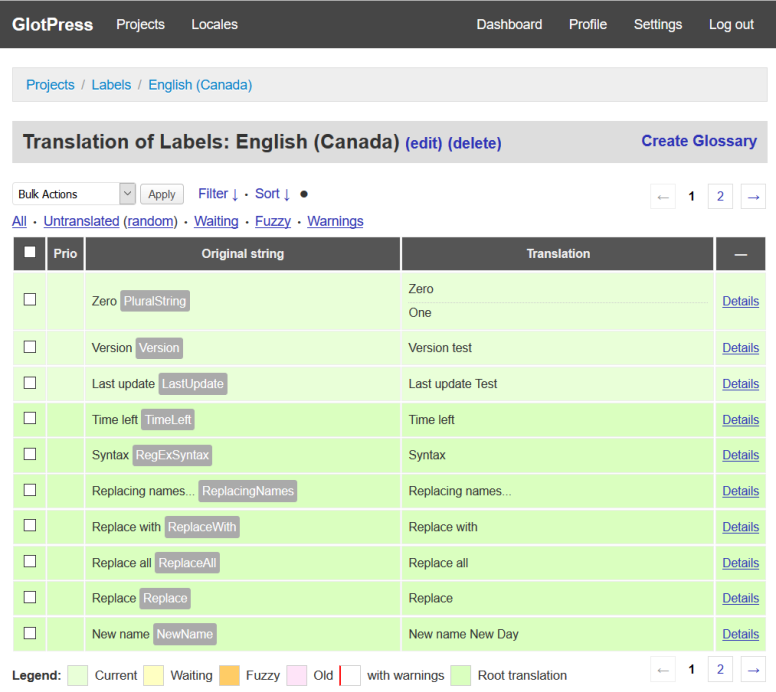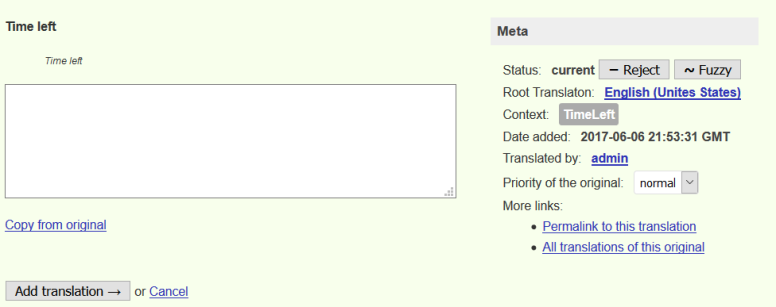An often requested feature in GlotPress has been to be able to support locale “variants”. This has been tracked as issue #226 on GitHub and has been open since January 2016.
Locale variants allows for a “root” language to have one or more “variants” of the language in which the variants automatically inherits the translations of the root for any missing translations.
This is useful for many popular languages, for instance English, Spanish, French, etc. where the vast majority of the translations are likely to be identical with minimal differences for local dialects.
PR #747 has recently been created with a solution for locale variants.
Ok so what does it look like?
The first thing to note that all of the below is based on the current PR, which may change by the time it is actually merged in to GlotPress.
Let’s say you have a project called “Labels”, with three locale’s defined:
- English (Unites States)
- Spanish (Spain)
- English (Canada)
One of these things isn’t like the others, but two of them are very close to being the same.
In the above situation, English (Canada) would inherit the translations form English (United States) for any translations that were not defined.
Going to the translation set page you would see something like this:

You’ll notice a new entry in the legend at the bottom of the page, “Root translation”, this indicates any translation shaded in this color (slightly darker green) is inherited from the root language instead of being marked as untranslated (white).
If you select one of these translations to edit you will see the following editor displayed:

Notice the addition of the “Root Translation” information under the Meta heading along with a link back to the root translation.
If you change the translation here and save it, a new translation entry for the locale will be created and the root translation will no longer be inherited.
Looks good so far, so now what?
The PR is mostly complete, however we are looking for some input on one part of the system; the relationship between root and variant languages.
As part of the PR an initial pass at defining the relationships between languages has been made but we are looking for input from the community to ensure they are correct and for any missing relationship that make sense.
One item to note is that root to variant relationships can only go one level deep, so you cannot define a variant of one root as the root of another one. So in our English example, you cannot do English (United States) -> English (Great Britain) -> English (Canada). This was done on purpose to ensure translations did not degrade in quality as they moved farther away from the original source language.
The current root/variant relationships in the PR (see the locales.php in the PR for full details) are as follows (the root is the top level name and the variants are in the bullet list):
Arabic
- Algerian Arabic
- Moroccan Arabic
Azerbaijani
- South Azerbaijani
- Azerbaijani (Turkey)
German
- German (Switzerland)
- Swiss German
Greek
English (Unites States)
- English (Australia)
- English (Canada)
- English (UK)
- English (New Zealand)
- English (South Africa)
Spanish (Spain)
- Spanish (Argentina)
- Spanish (Chile)
- Spanish (Colombia)
- Spanish (Costa Rica)
- Spanish (Guatemala)
- Spanish (Mexico)
- Spanish (Peru)
- Spanish (Puerto Rico)
- Spanish (Venezuela)
Persian
French (France)
- French (Belgium)
- French (Canada)
- French (Switzerland)
Dutch
Norwegian
Portuguese (Portugal)
Tamil
Chinese
- Chinese (China)
- Chinese (Hong Kong)
- Chinese (Singapore)
- Chinese (Taiwan)
A brief note about the slightly strange English root/variants, English (United States) was chosen as the root due to the vast majority of code that is written with it as the language of the source code. The root/variants relationships are assigned during the load of the locales file and can be altered for individual sites either through the use of a custom locales.php (using the GP_LOCALES_PATH define) file or through a plugin that hooks in to the GP_INIT hook.
Feedback on the above relationships (or any other part of the PR) is most welcome as always, you can visit the GitHub Issue or PR to participate.


